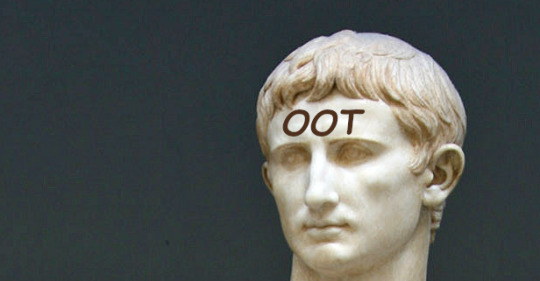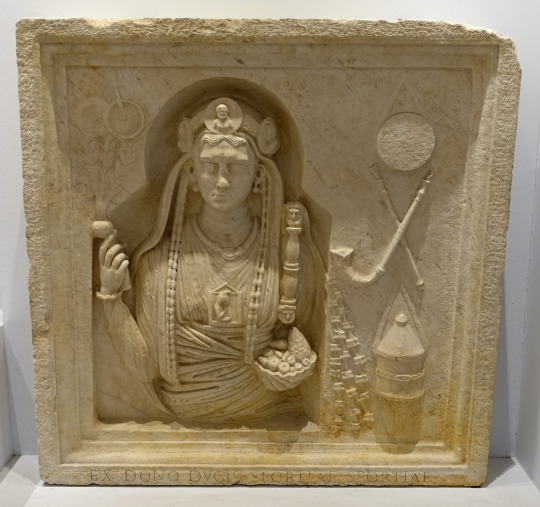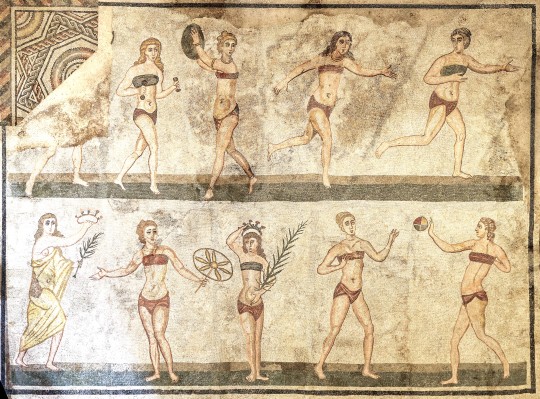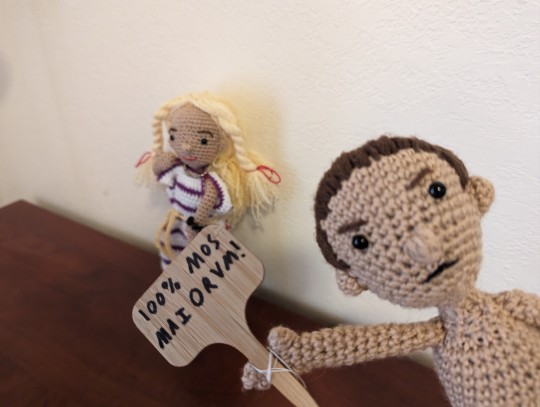Text

gaius marius actually won the numidian war by putting sulla in front of the enemy army and blinding them with his pale ass, this is the history historians don't want you to know
i'm actually a sulla adult cystic acne truther but i couldn't figure out how to draw it so. birthmark it is
29 notes
·
View notes
Text
queer classics: a speculative reading list
well i said i would so: my rec list for queer classics scholarship! this comes from my own experience with the subfield of queer classics during my time as a graduate student and my current life as an independent researcher.
i'll put it under a cut because it's long and because (gasp!) i capitalized more formally while i was writing it. if you find this resource useful and want to support an underemployed colleague, my ko-fi is here.
This list mixes multiple different kinds of scholarly resources, including academic books and articles, public-facing scholarship, blog posts, and conference recordings. It does not include primary source material (i.e., ancient texts themselves) – in part, because I think far more ancient texts are open to queer readings than those that make up the existing ‘canon,’ and in part because this reading list is more focused on methodology than it is on any one ancient source.
I’ve marked which texts are available for free online (*) and which are available with a JSTOR account or Academia.edu account (**). Most academic books or articles should be variously available in academic library systems. I have PDFs of the majority, so if you’re having trouble finding something, feel free to reach out!
Foundations of Gender and Sexuality Studies in Classics
These are some foundational works for thinking about gender and sexuality in the Greek and Roman worlds, which I would categorize under a methodological approach akin to LGBTQ+ studies. The primary distinction for me is that these works provide crucial information about systems of sexuality and relevant sources, but are often a) older and b) don’t use queer theory (or use it in a very limited way). This is by no means exhaustive, but it’s just a short selection of things that get cited often in queer Classics.
Sandra Boehringer, Female Homosexuality in Ancient Greece and Rome (2021; originally published as L’Homosexualité dans l’Antiquité grecque et romaine, 2007)
Kenneth J. Dover, Greek Homosexuality (1978)
Judith P. Hallett and Marylin B. Skinner (ed.), Roman Sexualities (1997) **
David M. Halperin, One Hundred Years of Homosexuality and Other Essays on Greek Love (1990)
David M. Halperin, John J. Winkler, and Froma Zeitlin (eds), Before Sexuality: The Construction of Erotic Experience in the Ancient Greek World (1990) **
Craig A. Williams, Roman Homosexuality (2010; 2nd edition)
John J. Winkler, The Constraints of Desire: The Anthropology of Sex and Gender in Ancient Greece (1990)
Queering Classics
As I mentioned above, these are selected primarily because I think they’re extremely valuable examples of queer Classics methodology. The ground that they cover in terms of sources, authors, time periods, etc. is not meant to be universal. My aim is moreso to show what queer Classics can be and what it can do; the methods can be applied to any source you want!
Kadji Amin, Disturbing Attachments: Genet, Modern Pederasty, and Queer History (2017) **
Marcus Bell and Eleanora Colli, “Queer Theory and Classics” (2022) *
Shane Butler, “Homer’s Deep” in Deep Classics: Rethinking Classical Reception (2016) and “The youth of antiquity: reception, homosexuality, alterity” in Classical Receptions Journal (2019) **
Cyberantiquities, “Sappho’s Yuri of Absence” (2023) *
Kay Gabriel, “Specters of Dying Empire: The Case of Carson’s Bacchae” in Tripwire: a journal of poetics *
Erik Gunderson, Staging Masculinity: The Rhetoric of Performance in the Roman World (2000) **
Ella Haselswerdt, “Sappho’s Body as Archive: Towards a Deep Lez Philology” in Critical Ancient World Studies: The Case for Forgetting Classics (ed. Mathura Umachandran and Marcella Ward; 2023)
Ella Haselswedt, Sara H. Lindheim, and Kirk Ormand (ed.), The Routledge Handbook of Classics and Queer Theory (2023)
Tom Hendrickson, “Gender Diversity in Greek and Latin Grammar: Ten Ancient Discussions” *
Maxine Lewis, “Queering Catullus in the Classroom: The Ethics of Teaching Poem 63” in From Abortion to Pederasty: Addressing Difficult Topics in the Classics Classroom (ed. Nancy Sorkin Rabinowitz and Fiona McHardy; 2014) **
Tom Sapsford, Performing the Kinaidos: Unmanly Men in Ancient Mediterranean Cultures (2022)
Sebastian Matzner, “Queer Unhistoricism: Scholars, Metalepsis, and Interventions of the Unruly Past” in Deep Classics: Rethinking Classical Reception (ed. Shane Butler; 2016)
Ky Merkley, “Writing trans histories with an ethics of care, while reading imperial Roman literature” in Gender & History (2023) *
Melissa Mueller, Sappho and Homer: A Reparative Reading (2023)
Kelly Nguyen, “Queering Telemachus: Ocean Vuong, Postmemories and the Vietnam War” in International Journal of the Classical Tradition (2021) **
Walter D. Penrose, Jr., Postcolonial Amazons: Female Masculinity in Ancient Greek and Sanskrit Literature (2016)
Queer and the Classical - Their website hosts video recordings from two conferences (2021 and 2022) and two seminar series (2020 and 2021) that brought together queer researchers and artists in the field, in order to bring about new and radical ways to imagine, think, and feel future engagements with the queer and the classical. Strongly recommended that you take a look at their wide selection of video recordings! *
Vanessa Stovall, “‘Quid Si Comantur?’: Pic(k/t)ing out Entangled Epistemologies of Ex(cess) in (Em)bodied Techne” (2021) *
Allison Surtees and Jennifer Dyer (ed.), Exploring Gender Diversity in the Ancient World (2020) **
Trans in Classics - Trans in Classics is a working group of the Society for Classical Studies that seeks to provide a community and source of advocacy for trans folx within Classics and to promote and produce scholarship that discusses trans-identities, issues, and readings. Currently their site hosts announcements on relevant events and publications. *
J. L. Watson, “Reframing Iphis and Caeneus: Trans Narratives and Socio-Linguistic Gendering in Ovid’s Metamorphoses” in Helios (2021)
Queer Theory Recommendations
These are some authors in the field of queer theory whose work nominally has nothing to do with Classics. I would argue that an important part of queer Classics methodology is exposing oneself to queer scholarship outside of Classics. Here are some great starting points!
Sara Ahmed, Queer Phenomenology: Orientations, Objects, Others (2006) **
Marquis Bey, Black Trans Feminism (2022) **
Judith Butler, Gender Trouble: Feminism and the Subversion of Identity (1990) and Bodies That Matter: On the Discursive Limits of Sex (1993) - Really, the secret with Butler is that basically whatever you read of theirs first is going to be immensely confusing BUT the more you read, the more you understand what they’re doing. Their work is very referential (both to itself and to its theoretical predecessors), so it takes time and investment to work through. If a whole book seems to daunting, a good starting point might be an early essay like "Imitation and Gender Insubordination" (1990) * or one of their interviews (like this one with Artforum) *, where they tend to be more straightforward.
Paisley Currah, Sex is as Sex Does: Governing Transgender Identity (2022)
Ann Cvetkovich, An Archive of Feelings: Trauma, Sexuality, and Lesbian Public Cultures (2003) **
Carolyn Dinshaw, Getting Medieval: Sexualities and Communities, Pre- and Postmodern (1999)
Elizabeth Freeman, Time Binds: Queer Temporalities, Queer Histories (2010) **
Jules Gill-Peterson, A Short History of Trans Misogyny (2024)
Jack Halberstam, In a Queer Time and Place: Transgender Bodies, Subcultural Lives (2005) and The Queer Art of Failure (2011) **
Saidiya V. Hartman, Wayward Lives, Beautiful Experiments: Intimate Histories of Social Upheaval (2019)
Heather Love, Feeling Backward: Loss and the Politics of Queer History (2007) **
José Esteban Muñoz, Disidentifications: Queers of Color and the Performance of Politics (2005) and Cruising Utopia: The Then and There of Queer Futurity (2009) **
Paul Preciado, Countersexual Manifesto (2000) **
Eve Kosofsky Sedgwick, Epistemology of the Closet (1990) and Between Men: English Literature and Male Homosocial Desire (1993)
Monique Wittig, “One is Not Born a Woman” (1981) *
492 notes
·
View notes
Note
Ngl your icon looks like the dad from calvin and hobbes so when I come across your history posts I just 👀
Thank you, anon. I can only aspire to embody the lowkey chaos of Calvin's dad.
I must also thank Larry Gonick's simple-yet-expressive art style in his Cartoon History of the Universe, Volume II, where we meet the hyperactive manwhore in my icon:

Wonderful book series, hilarious and educational. I'm not even a Caesar apologist, but every time I look at this gleeful bastard and his rancid vibes I start laughing again.
#NAURRR 😭#seeing your profile pic in context is so jarring!#im used to just your profile pic#not the whole original drawing!#crazy#the cartoon history of the universe#larry gonick
34 notes
·
View notes
Text
can’t stop thinking about them
#teezeyteezaikai???#im honestly curious as to how that happened#this is a linguistic mystery#its like anglophones pronouncing latin#not rome
18K notes
·
View notes
Text

See this is incredibly niche – not just because of the topic but also because the joke itself is deeply stupid. But I have to share my vision, you understand.
19 notes
·
View notes
Text

Thank you @theromaboo and everyone who got me to 2000 reblogs!
GOOD LORD I DID NOT THINK REBLOGGING MY OWN POST ABOUT MY RETROSPECTIVE DIAGNOSES WOES WOULD GIVE ME MY 2000TH REBLOG
I'm currently trying to prove that Britannicus was not allergic to horses, or at least that there is no evidence that suggests he was and I'm having some issues (AHHHHHHHHHH)
12 notes
·
View notes
Text
I have to take a break with this lest it drive me mad. Every time I find a new lead, I can't find anywhere to read the thing. I'm just going to sit with my 95% certainty and try not to let the 5% of doubt get to me.
I'm currently trying to prove that Britannicus was not allergic to horses, or at least that there is no evidence that suggests he was and I'm having some issues (AHHHHHHHHHH)
#however i did find something very useful#the original crucial german text was written by johannes ring in 1985#much later#in 2014#johannes ring wrote another thing called history of allergies in antiquity#and in it is where it is stated that the idea that britannicus was allergic to horses came from a historical fiction novel#the same dude!#if he is admitting that his idea came from a historical fiction novel#then thats certainly where its from#now im 99% sure#but im still dying to read the original crucial german text!!#britannicus#illnesses in the julio claudian dynasty
12 notes
·
View notes
Text
I'm currently trying to prove that Britannicus was not allergic to horses, or at least that there is no evidence that suggests he was and I'm having some issues (AHHHHHHHHHH)
#i have managed to trace back the idea that britannicus was allergic to horses back to one crucial german text#i am 95% sure on what source the german text used (a historical fiction novel)#but i do not know until i read that crucial german text#and of course that thing is impossible to find anywhere#SCREAMS#what am i to do?#so many people say that britannicus was allergic to horses that i start to feel like it has to be true!#but whats the original source of the whole thing?#ahhhhhhhh#groan#britannicus#illnesses in the julio claudian dynasty
12 notes
·
View notes
Text

In honour of Vowel Month please take this highly serious poll about your favourite vowels!!!
tumblr polls only have 10 options so we're going with the weird bois, sorry schwa, it's not my fault danny j didn't love you
(don't know what these symbols mean? vote on vibes or listen to our friend danny jones saying all the vowels on an old school record here)
568 notes
·
View notes
Text
something incredibly funny about reading about the works of an ancient artist and seeing some scholar making fun of their art style. like straight up just saying "can i give some constructive criticism? it looks like shit"

#i once read a history book that tore apart this one poem attributed to hadrian#the animula vagula blandula one#he said you didnt even need to know latin to know the poem sucked balls#ouch#funny
813 notes
·
View notes
Text


Aosta over in North Italy used to be called Augusta Praetoria Salassorum, but of course nobody wanted to say all that.


2000 years later, the most powerful man in Europe is nought but an oot.
#there are like a billion places in europe that used to have compliated latin names#but now its name sounds like you tried to pronounce its latin name with your mouth full and then just quit#colonia claudia ara agrippinensium?#how about cologne?#and its german name is köln#im sure there are a dozen other examples of cities named after augustus that have evolved over time#linguistics#aosta
62 notes
·
View notes
Text
The Ninth Day of Julius Caesar
As a person who enjoys looking at retrospective diagnoses maybe a little bit too much, I have read quite a significant amount of works regarding Julius Caesar. He is traditionally said to have had epilepsy (though we don't know for sure if it's true or not) and so many people have done medical speculation over him over the years.
However, no one's perfect!
My favourite source on this topic will always be Julius Caesar's Disease by Francesco Galassi and Hutan Ashrafian. It's a very neat book about the history of this topic and it looks at bunch of other people's theories, but mainly it argues that Caesar did not have epilepsy but transient ischemic attack. I don't like it because I hate the epilepsy theory and really like this new theory (I consider myself to be neutral in this topic because we can never know), I like it because it is the first thing I've read on this topic that actually had some common sense and wasn't making mistakes all over the place!
However, it's pretty recent, from 2015, and people writing between 2004 and 2015 couldn't use it, so they all went and used a source I don't really like.
Enter "Dictator Perpetuus: Julius Caesar—Did he have seizures? If so, what was the etiology?" by John R. Hughes.
A hint about what I dislike about this source is that it was published in a medical journal. If a retrospective diagnosis work is published in a medical journal, prepare for good medical information but bad historical information. And if it is published in a history journal, vice versa. Context matters! Everyone publishing stuff about this are either doctors or historians and usually it's easy to tell which one the writer is.
Anyway, this one... it could be worse. It's certainly not the most diabolical thing you could read in the whole retrospective diagnoses of Caesar topic (that would go to "Searching for Neurological Diseases in the Julio-Claudian Dynasty"!) but there are a few parts of it that are very poorly done. And for some reason, the only parts that had any influence at all are the poorly done parts!
In the abstract, there is one silly sentence that is the bane of my existence: "His son, Caesarion, by Queen Cleopatra, likely had seizures as a child, but the evidence is only suggestive."
The evidence is only suggestive? I didn't know that was a euphemism for "I cited a modern historical fiction novel," because that's where the evidence came from. Historical fiction!
At least Hughes is pretty honest about where his information comes from and he does say that the only source for that is historical fiction and not ancient sources. But, why put it in?
Anyway, probably from the vague wording in the abstract, it's become a common misconception that Caesarion had epilepsy. People keep saying that and citing this work but if they had actually read it, I don't think they would've been impressed or convinced. Because in the text itself, it's clear that the source is historical fiction! It's only ambiguous in the abstract.
Maybe Caesarion did have epilepsy, we don't know much about him, but there is no evidence at all because historical fiction doesn't count as evidence.
This is actually mentioned in Julius Caesar's Disease! Unfortunately I cannot find the book right now, but I remember that it basically said "I like Masters of Rome, but I don't cite it!"
The author of one of the historical fiction novels actually said in the author's note "This detail about Caesarion I made up and there is no ancient sources that support it. It's not completely impossible, but don't cite this," and guess what happened? I feel so bad for her. If I was unwillingly the cause of a misconception, either my ego would balloon or I'd run away and become a hermit.
(Did you know that once an AI plagiarized me? I was talking to a chatbot about ancient Rome and I was really agreeing with it. I was like "wow this is literally exactly what I would write about this" and then I realised that it was literally exactly what I wrote about it because the AI had stole my words! Seeing my idea somewhere else certainly made my ego ten times bigger so maybe if I start a misconception it'll have the same effect?)
What's funny is that if I had a nickle for everytime this happened (someone citing a historical fiction book in which a male teenager who had a famous father and could've been heir to him and who is a part of Roman history during the first century BC to the first century AD had a medical condition in the historical fiction novel that is not supported by any ancient source and then a bunch of people citing the person who originally cited the historical fiction book until that detail becomes a misconception), I'd have two nickles. How does this happen twice? And how it that the two historical figures are so similar too? This misconception (not the Caesarion one) made its way onto Wikipedia so that's fun!
I know this misconception isn't actually about Caesar, but Caesarion. It's somewhat relevant to Caesar so it's fine! Alright guys remember, historical fiction is not a good source. This theory about Caesarion doesn't have "suggestive" evidence, but no evidence at all.
I'm sorry that I've really been slacking with my series. And I'm sorry that today's post is probably completely unreadable (I was really struggling to make words make sense). I promise I'll finish eventually, because once I finish this series, I'll finally be free.
#the 15 days of julius caesar#ancient rome#julius caesar#gaius julius caesar#caesarion#ides of march#the ides of march#roman history#historical fiction#retrospective diagnoses#medical history
15 notes
·
View notes
Text
It's the late Roman Republic...
Now put in the tags what you selected and who you THINK it's referring to... Because I sneakily had at least two people in mind when I made each option and when the poll is over I'll reveal who I had in mind for each option
135 notes
·
View notes
Text
A wild Sewpronia appears! She's here to kick ass and trans gender!

Sewpronia is a gallus, a devotee of Magna Mater from ancient Rome. The galli originated in what's now Turkey - or maybe Greece, or Mesopotamia. They arrived in Rome during the Second Punic War, after a prophecy declared the Romans couldn't win without the help of Magna Mater.

Galli were assigned male at birth, but they dressed femininely. They may have been what we'd now call transfeminine, nonbinary, or a "third gender" in Roman society: "They say they are not men...they want to pass as women," as Firmicus Maternus said.
It's always messy to use modern identities for ancient cultures. But for our purposes, Sewpronia is a trans gal. Her name is a pun on Sempronia the conspirator from Bellum Catilinae, because every woman needs to commit a little treason sometimes.

Her white and purple tunic, yellow shoes and makeup come from a description of the galli in Apuleius' Metamorphosis, the black and bronze jewelry are based on a gallus' grave found in northern England, and her long bleached hair follows the description in Robert Turcan's The Cults of the Roman Empire. Underneath, she has a strophium (bra/chest wrap) and subligaculum (loincloth).

Roman women wore this bikini-like outfit when exercising, as shown in this Sicilian mosaic:

The galli had a curious place in Roman society. Men who were seen as too effeminate were looked down upon, and being compared to a gallus was typically an insult. I'm also not sure whether Roman citizens could become galli, or only non-citizens could, or if this changed over time. But everyone accepted that there was a place for the galli and their goddess in Rome - even Cato wouldn't have disputed that!

Please excuse any historical inaccuracies or poor styling choices I made - and send me any good sources on the galli you know so I can learn more! In the meantime, I'm going to make Sewpronia more cute outfits. She appreciates them much more than Cato the "shoes are modern decadence" Yarnier.

Sewpronia and Cato are based on Allison Hoffman's AmiguruME doll pattern. Happy Trans Day of Visibility, everyone!
#OMG#YES#I LOVE THIS#very nice#sewpronia#cato the yarnier#crochet#galli#gallus#trans day of visibility#trans#ancient rome
72 notes
·
View notes
Text
LISTEN IM MUCH BETTER AT LATIN NOW! Ignore whatever younger me said about anything. I am ablative fan now.
Here are the Latin cases, ranked from my favourite, to my least favourite. Probably belongs on r/unpopular opinion.
Favourite: vocative. OH MY GOD VOCATIVE IS THE SEXIEST CASE EVER. I remember when I had 0 Latin skill and learned from Duolingo. Duolingo would use the vocative case with no explanation. And I would be like "Huh, why is it Marce here and Marcus there?" (Duolingo sucks at explaining grammar) Anyways, ever since those days, I've always loved vocative. It just has an aura of sexiness.
Second favourite: accusative. I dunno, it just brings me joy. It's just so... cool. And I associate accusative with the color red. I dunno. Accusative just has an extra layer of swag.
Third favourite: nominative. What could ever go wrong with trusty dusty nominative? And the nominative is sometimes extra spicy. Like, um, rex or something. The nominative feels the sturdiest. It's great.
Fourth favourite: dative. Dative is chill. I associate it with the color blue.
Fifth favourite: genitive. Genitive is neutral for me. I don't care for it.
Least favourite: ablative. Ablative is... I don't really like it.
Extra: locative. Locative is okay.
89 notes
·
View notes
Text
You needn't worry, younger me, it's been fixed! (most of) the Latin fics are actually in Latin now!
I'm so mad. In AO3, you can make your fic's language Lingua Latina. I checked the Lingua Latina language category and was amazed at the rather large number of fics. Then I looked at them.
They were ALL in Spanish!
9 notes
·
View notes
